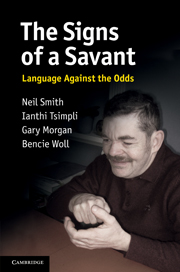1 - Introducing Christopher
Published online by Cambridge University Press: 05 July 2014
Summary
Every once in a while Nature gives us insight into the human condition by providing us with a unique case whose special properties illumine the species as a whole. Christopher is such an example. On first inspection his fate may not seem fortunate. Because he is unable to look after himself, he lives in sheltered accommodation; on a variety of standard tests of intelligence he scores poorly, with particular difficulty on non-verbal tests; his horizons seem to be limited to the performing of routine tasks of a non-demanding nature. His life looks sadly circumscribed. Until one turns to language.
Despite his disabilities, which mean that everyday tasks are burdensome chores, Christopher is a linguistic wonder: with varying degrees of fluency, he can read, write, speak, understand and translate more than twenty languages. Playing noughts and crosses is beyond him, but interpreting between German and Spanish is easy; he doesn’t understand the kind of make-believe play that 3- or 4-year-old children indulge in – pretending that a banana is a telephone for instance – but he learns new languages, from Berber to Welsh, with enviable ease. His drawing ability indicates a severely low IQ of between 40 and 60 (a level hinting at ineducability), yet his English language ability indicates a superior IQ in excess of 120 (a level more than sufficient to enter University). Christopher is a savant, someone with an island of startling talent in a sea of inability.
- Type
- Chapter
- Information
- The Signs of a SavantLanguage Against the Odds, pp. 1 - 42Publisher: Cambridge University PressPrint publication year: 2010

